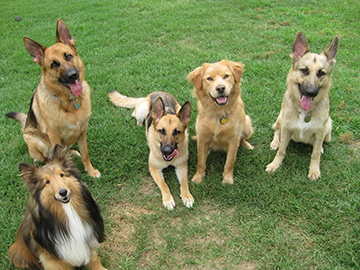10 Dog Breed Myths
Revealing the truth behind these common misconceptions.
By Audrey Pavia
Urban legend isn’t limited only to stories about Bigfoot and Pop Rocks. A number of dog breeds have also fallen victim to rumors that have spread like wildfire through the years. Here’s a look at 10 myths about dog breeds and the truth behind the rumors.

1 .Myth: Irish Setters Are Dumb.
It’s hard to know how this rumor started. It could be because of the Irish Setter’s puppyish, clown-like nature. Not serious and stoic like some sporting breeds, the Irish Setter likes to goof around. The truth is that Irish Setters are highly trainable, intelligent dogs bred to work closely with hunters out in the field.

2. Myth: Greyhounds Need a Lot of Exercise.
Not surprisingly, people think that because Greyhounds are famous for their talents on the racetrack, they need a lot of exercise. The truth is that Greyhounds are actually couch potatoes who prefer to cuddle up on the sofa than run around digging up the backyard. Although they love long walks, Greyhounds actually make great house dogs.

3. Myth: Rottweilers Are Vicious.
Although Rottweilers were bred to be guard dogs, they are also very trainable and affectionate. They are not mean by nature, as some people believe, and like any dog, make wonderful companions if they are properly trained and socialized. Although a Rottweiler will give off a ferocious bark when protecting his territory, a well-socialized Rottweiler will greet strangers with a wagging tail once his owner lets him know guests are welcome.

4. Myth: Pugs Are Lazy.
Some people are under the impression that Pugs just want to lay around the house all day. This couldn’t be further from the truth. Although by no means hyper, Pugs are active and happy members of the family, and are often underfoot, looking for the next adventure. Even though they aren’t bred for jogging alongside their human companions, they still enjoy running around the yard chasing a ball or another dog.

5. Myth: Pit Bulls Can Lock Their Jaws.
Pit Bulls suffer from very bad press, and one of the stories often repeated by those who don’t know better is that these dogs can lock on to a human or other dog during a fight. In truth, Pit Bulls have the same mechanics in their jaws as other dog breeds.

6. Myth: Long-haired Breeds Need to be Shaved in the Summertime.
Although dogs such as Siberian Huskies, Chow Chows and American Eskimos might look uncomfortable in the summertime with their long coats, nature has provided them with fur that allows the heat to escape from their bodies when the weather is warm.

7. Myth: Small Breed Dogs Live Longer than Large Breed Dogs.
As a general rule, this is actually true: Smaller breeds tend to live longer than larger breeds. While a Saint Bernard might only make it to 7 years, a Chihuahua can live to be 14 or more.

8. Myth: Shetland Sheepdogs Are Miniature Collies.
Although Shelties might look like small Collies, they are actually a completely separate breed. The American Kennel Club recognizes the Sheltie and the Collie as two distinctly different dogs, both with inborn instincts to herd livestock.

9. Myth: Jack Russell Terriers Are Hyperactive.
Jack Russell Terriers are busy dogs with a lot of energy, but they aren’t hyperactive. While they do need lots of exercise, more than anything, Jack Russells need something to occupy their minds. Interactive toys and playtime with their human companions usually fit the bill.

10. Myth: Labrador Retrievers Have Webbed Feet.
As odd as this may sound, it’s actually true; Labs do have webs between their toes. This feature was bred into the Lab to help him swim, as the breed was originally created to retriever downed waterfowl. Labs can also use their tails as rudders when they are swimming.
About the Author: Audrey Pavia is an award-winning freelance writer and author of “The Labrador Retriever Handbook.” She is a former staff editor of Dog Fancy, Dog World and The AKC Gazette magazines. To learn more about her work, visit www.audreypavia.com.





